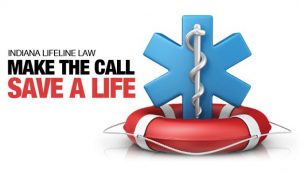
(BLOOMINGTON) – In 2012, the Indiana General Assembly passed a law (Indiana’s Lifeline Law) that provides limited immunity from arrest and prosecution for certain alcohol-related offenses for individuals who seek emergency medical help for someone else. The law was amended in 2014 to extend limited immunity to victims of certain sex offenses, those who seek help for them, and those who report what they reasonably believe to be a crime.
Indiana’s Lifeline Law was a response to growing concern about young people’s experiences with alcohol. A 2014 national survey by the Substance Abuse and Mental Health Services Administration found that almost 60 percent of college students ages 18–22 had consumed alcohol in the past month, and almost 2 out of 3 of them had engaged in binge drinking during that same timeframe. The division of NIH that deals with alcohol abuse reports that approximately 1,825 college students between the ages of 18 and 24 die each year from alcohol-related unintentional injuries.
Sometimes, the people who are in the best position to get help for someone suffering from an acute alcohol emergency are afraid to seek help because they’re afraid they’ll get in trouble as a result of their own use of alcohol. The start of a new school year is the perfect time to remember and discuss the dangers associated with alcohol use by college students.
Who is eligible for limited immunity under Indiana’s Lifeline Law?
To qualify for limited immunity, a person must have:
- Requested emergency medical assistance for someone else, or acted in concert with a person who made a request
- Been the victim of a covered sex offense (includes most common sex offenses)
- Witnessed and reported what the person reasonably believed to be a crime
What must an eligible person do to receive limited immunity?
To receive limited immunity, a person described above must:
- Provide their full name
- Provide any other relevant information requested by law enforcement
- Remain at the scene with the person who needs help until help arrives
- Cooperate with emergency personnel and law enforcement at the scene
What alcohol-related crimes are covered?
The Lifeline Law provides limited immunity from arrest and prosecution for the following alcohol-related crimes:
- Public intoxication
- Illegal possession (including possession, consumption, and transportation of alcohol)
What about the person who needed help?
- If they’re the victim of a reported sex offense, they’re immune from arrest and prosecution for the alcohol-related offenses listed above.
- If not, they can be arrested and prosecuted for alcohol-related offenses. If it’s their first offense they can ask to be placed under court supervision, with the chance to earn a dismissal of the charges.
What else should I know about Indiana’s Lifeline Law?
- The law doesn’t provide immunity from prosecution for charges related to controlled substances (illegal drugs), only alcohol. However, having sought help for someone else for a medical emergency related to their use of alcohol or a controlled substance is a mitigating circumstance that courts can consider when sentencing a person convicted of a crime.
- Although the Lifeline Law protects eligible individuals from criminal prosecution, IU students who consume alcohol illegally may still face consequences at the university disciplinary level. These consequences are typically less severe than associated criminal penalties.
Most of us would agree that we should always seek help for someone experiencing a medical emergency, regardless of the potential legal consequences. The good news for students at IU is that thanks to Indiana’s Lifeline Law, they can seek help for others who are experiencing medical emergencies without fear of being prosecuted for the most common alcohol-related crimes. The result is a safer campus for all.
Need More Help?
For help with specific legal questions or issues, contact Student Legal Services. We’re here to serve the legal needs of IU Bloomington students. Call us at (812) 855-7867 for more information.
To schedule an appointment, visit our website at getlegal.indiana.edu or come in and fill out an intake form at 703 E. 7th Street.
Student Legal Services is a department of the Division of Student Affairs
Written by: Marc Abplanalp – Attorney, Student Legal Services at Indiana University.




